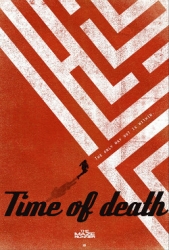A Death in Vienna

A Death in Vienna читать книгу онлайн
The sins of the past reverberate into the present, in an extraordinary novel by the new master of international suspense.
It was an ordinary-looking photograph. Just the portrait of a man. But the very sight of it chilled Allon to the bone.
Art restorer and sometime spy Gabriel Allon is sent to Vienna to authenticate a painting, but the real object of his search becomes something else entirely: to find out the truth about the photograph that has turned his world upside down. It is the face of the unnamed man who brutalized his mother in the last days of World War II, during the Death March from Auschwitz. But is it really the same one? If so, who is he? How did he escape punishment? Where is he now?
Fueled by an intensity he has not felt in years, Allon cautiously begins to investigate; but with each layer that is stripped away, the greater the evil that is revealed, a web stretching across sixty years and thousands of lives. Soon, the quest for one monster becomes the quest for many. And the monsters are stirring…
Rich with sharply etched characters and prose, and a plot of astonishing intricacy, this is an uncommonly intelligent thriller by one of our very best writers.
Внимание! Книга может содержать контент только для совершеннолетних. Для несовершеннолетних чтение данного контента СТРОГО ЗАПРЕЩЕНО! Если в книге присутствует наличие пропаганды ЛГБТ и другого, запрещенного контента - просьба написать на почту [email protected] для удаления материала
The space they entered was roughly two city blocks long, and filled with endless ranks of steel shelves sagging beneath the weight of wooden crates. Gulls were flying in and out of the broken windows. Gabriel could hear the scratching of tiny clawed feet and the mewing of a catfight. The smell of dust and decaying paper seeped through the protective mask. The subterranean archive of the Anima in Rome seemed a paradise compared to this squalid place.
“What are these?”
“The things Perón and his spiritual successors in the Menem government didn’t think to destroy. This room contains the immigration cards filled out by every passenger who disembarked at the Port of Buenos Aires from the 1920s to the 1970s. One floor down are the passenger manifests from every ship. Mengele, Eichmann, they all left their fingerprints here. Maybe Otto Krebs, too.”
“Why is it such a mess?”
“Believe it or not, it used to be worse. A few years ago, a brave soul named Chela alphabetized the cards year by year. They call this the Chela room now. The immigration cards for 1963 are over here. Follow me.” Ramirez paused and pointed toward the floor. “Watch out for the catshit.”
They walked half a city block. The immigration cards for 1963 filled several dozen of the steel shelves. Ramirez located the wooden boxes containing cards with passengers whose last name began withK, then he removed them from the shelf and placed them carefully on the floor. He found four immigrants with the last name Krebs. None had the first name Otto.
“Could it be misfiled?”
“Of course.”
“Is it possible someone removed it?”
“This is Argentina, my friend. Anything is possible.”
Gabriel leaned against the shelves, dejected. Ramirez returned the immigration cards to the box, and the box to its place on the steel shelf. Then he looked at his watch.
“We have an hour and forty-five minutes till they close up for the night. You work forward from 1963, I’ll work backward. Loser buys the drinks.”
A THUNDERSTORM MOVED down from the river. Gabriel, through a broken window, glimpsed heat lightning flickering amid the cranes of the waterfront. The heavy cloud blocked out the late-day sun. Inside the Chela room it became nearly impossible to see. The rain began like an explosion. It swept through the gaping windows and soaked the precious files. Gabriel, the restorer, pictured running ink, images forever lost.
He found the immigration cards of three more men named Krebs, one in 1965, two more in 1969. None bore the first name Otto. The darkness slowed the pace of his search to a crawl. In order to read the immigration cards, he had to lug the boxes near a window, where there was still some light. There he would crouch, his back to the rain, fingers working.
The girl from the registrar’s desk wandered up and gave them a ten-minute warning. Gabriel had only searched through 1972. He didn’t want to come back tomorrow. He quickened his pace.
The storm ceased as suddenly as it began. The air was cooler and washed clean. It was quiet, except for the sound of rainwater gurgling in the gutters. Gabriel kept searching: 1973… 1974… 1975…1976… No more passengers named Krebs. Nothing.
The girl returned, this time to chase them out for the night. Gabriel carried his last crate back to the shelf, where he found Ramirez and the girl chatting away in Spanish.
“Anything?” Gabriel asked.
Ramirez shook his head.
“How far did you get?”
“All the way. You?”
Gabriel told him. “Think it’s worth coming back tomorrow?”
“Probably not.” He put his hand on Gabriel’s shoulder. “Come on, I’ll buy you a beer.”
The girl collected their laminated badges and accompanied them down in the freight elevator. The windows of the Sirocco had been left open. Gabriel, depressed by failure, sat on the sodden car seat. The thunderous roar of the engine shattered the quiet of the street. Chiara followed as they drove away. Her clothing was drenched from the rain.
Two blocks from the archives, Ramirez reached into his shirt pocket and produced an immigration card. “Cheer up, Monsieur Duran,” he said, handing the card to Gabriel. “Sometimes, in Argentina, it pays to use the same underhanded tactics as the men in charge. There’s only one copier in that building, and the girl runs it. She would have made one copy for me and another for her superior.”
“And Otto Krebs, if he’s still in Argentina and still alive, might very well have been told we were looking for him.”
“Exactly.”
Gabriel held up the card. “Where was it?”
“Nineteen forty-nine. I suppose Chela stuck one in the wrong box.”
Gabriel looked down and began to read. Otto Krebs arrived in Buenos Aires in December 1963 on a boat bound from Athens. Ramirez pointed to a number written in hand at the bottom: 245276/62.
“That’s the number of his landing permit. It was probably issued by the Argentine consulate in Damascus. The ‘sixty-two’ at the end of the line is the year the permit was granted.”
“Now what?”
“We know he arrived in Argentina.” Ramirez shrugged his heavy shoulders. “Let’s see if we can find him.”
THEY DROVE BACK to San Telmo through the wet streets and parked outside an Italianate apartment house. Like many buildings in Buenos Aires, it had been beautiful once. Now its façade was the color of Ramirez’s car and streaked by pollution.
They climbed a flight of dimly lit stairs. The air inside the flat was stale and warm. Ramirez locked the door behind them and threw open the windows to the cool evening. Gabriel looked into the street and saw Chiara parked on the opposite side.
Ramirez ducked into the kitchen and came out holding two bottles of Argentine beer. He handed one to Gabriel. The glass was already sweating. Gabriel drank half of it. The alcohol took the edge off his headache.
Ramirez led him into his office. It was what Gabriel expected-big and shabby, like Ramirez himself, with books piled in the chairs and a large desk buried beneath a stack of papers that looked as though it was waiting for the match. Heavy curtains shut out the noise and the light of the street. Ramirez went to work on the telephone while Gabriel sat down and finished the last of his beer.
It took Ramirez an hour to come up with his first clue. In 1964, Otto Krebs had registered with the National Police in Bariloche in northern Patagonia. Forty-five minutes later, another piece of the puzzle: In 1972, on an application for an Argentine passport, Krebs had listed his address as Puerto Blest, a town not far from Bariloche. It took only fifteen minutes to find the next piece of information. In 1982, the passport was rescinded.
“Why?” Gabriel asked.
“Because the holder of the passport died.”
THE ARGENTINE SPREAD a dog-eared roadmap over a table and, squinting through his smudged reading glasses, searched the western reaches of the country.
“Here it is,” he said, jabbing at the map. “San Carlos de Bariloche, or just Bariloche for short. A resort in the northern lake district of Patagonia, founded by Swiss and German settlers in the nineteenth century. It’s still known as the Switzerland of Argentina. Now it’s a party town for the ski crowd, but for the Nazis and their fellow travelers, it was something of a Valhalla. Mengele adored Bariloche.”
“How do I get there?”
“The quickest way is to fly. There’s an airport and hourly service from Buenos Aires.” He paused, then added, “It’s a long way to go to see a grave.”
“I want to see it with my own eyes.”
Ramirez nodded. “Stay at the Hotel Edelweiss.”
“The Edelweiss?”
“It’s a German enclave,” Ramirez said. “You’ll find it hard to believe you’re in Argentina.”
“Why don’t you come along for the ride?”
“I’m afraid I’d be something of a hindrance. I’m persona non grata among certain segments of the Bariloche community. I’ve spent a little too much time poking around there, if you know what I mean. My face is too well known.”























